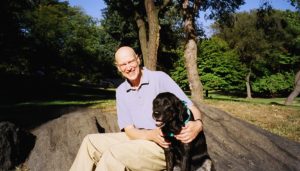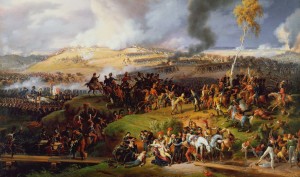
Margaret Wheatley, the complexity theorist, explains how personal growth takes place: “You cannot change a living thing from the outside. You can only disturb it so it changes itself.” Leadership development then, is largely about how we learn and grow in response to the disturbances or stimuli that life offers us.
These “disturbances” can come from many sources; teachers, role models, or the study of nature for example. We can all think of the big influences in our lives, and how they changed the way we think, feel or behave. A profound set of lessons for me came from an unexpected source – my 14-year journey with a four-legged creature, my Black Labrador, Maisie.
Life With Maisie
Maisie came to us from the Guiding Eyes For The Blind. At 18 months she had “failed” her final test, thus becoming what they euphemistically call a “release dog” and available for adoption. In due course we were approved, and excitedly welcomed her into our family. It soon became apparent why Maisie had failed at the final hurdle – she was just too eager to please. She would likely have led a blind person into all kinds of playful but inadvisable adventures.
Certain memories become imprinted in our minds. So it was the day Maisie joined our family. I saw her for the first time when I got home from a day of teaching. We looked intently at each other, in a kind of mutual sizing up. She was a sleek, shiny, beautifully athletic canine youngster, exuding curiosity and eagerness. After this brief inspection her tail began to wag and she trotted towards me for our first greeting. She had decided I was okay. What struck me more than anything else that day were Maisie’s deep brown eyes; shining and youthful, but somehow also discerning and wise.
From then on, Maisie and I walked the path of life together. We developed a growing bond built on time spent together in my home office, daily walks in the park, playing chase, often traveling together. We were seldom apart and learned to understand each other’s moods, needs and expectations.
It is a truism that we are closest to those who have been our lifelong friends. Maisie knew me for 14 years, but I knew her through all her life stages – from her exuberant squirrel-chasing youth, through her more sedate middle age, to her faltering old age and eventual demise. Despite this mismatch in our life cycles, I would venture that Maisie knew me at least as well as I knew her, and in a number of respects even better.
Many of my memories of my years with Maisie are purely sentimental. I have a scrapbook that I page through regularly, quietly savoring the special bond we shared. But beyond this nostalgia, this relationship revealed to me some important lessons about life and leadership.
The real meaning of transparency
In the business world, we emphasize how important it is for companies and their leaders to be “transparent.” To clarify this buzzword we come up with sophisticated definitions of what this actually means, from the rules for “full disclosure” in financial statements to simple calls for honesty in our dealings with others.
When this topic comes up in my seminars, I reflect on what I learned from Maisie and often ask how many attendees own a dog. Usually this is around 50%. Then I offer this advice, “If you want to understand what true transparency looks like, observe your dog.” I then ask the dog owners to describe to the rest of the group what they see in their dog’s behavior. What follows is a great discussion about the real meaning of transparency.
Day in and day out Maisie revealed her mood or feelings without reservation — whether joy, fear, pain, hunger, playfulness or just the need for a walk. No pretenses, no vanity, no ulterior motives, no defensiveness, no fear of being judged; just plain honesty and most important of all, humility. I can’t think of a better transparency check list for business leaders.
Living in the moment
Seneca, the Roman philosopher and statesman, counseled that “The greatest obstacle to living is expectancy, which hangs upon tomorrow and loses today. You are arranging what lies in Fortune’s control and abandoning what lies in yours.”
Logic tells us this is true. Yet how hard it is for us lofty humans to live in the here and now. We pride ourselves in our ability to interpret the past and contemplate the future, and in the process we too often forsake the present. It is always instructive to hear the stories of people who have been through a near death event. It jolts them into experiencing the rest of their lives in the present tense, and they tell us how transformative this has been.
Animals are often wiser than we are. Maisie was a daily reminder of what it means to live in the moment, to experience life as it unfolds. If I could have asked her, “Maisie, what time is it?” she would have answered, “The time is now.” Ah, yes, of course it is …
The power of encouragement
Maisie loved to learn new things, and I sometimes worked with a dog trainer to add to her repertoire. At a certain point the trainer said, “You are Maisie’s mentor, so should take over the training now. It’s part of your relationship with her.”
Feeling unprepared, I sought the trainer’s advice. “What is the key to training a dog well? Repetition, discipline, lots of rewards?” She replied, “Yes, all those. But you have left out the biggest one – encouragement. Give her a sense of achievement by setting manageable tasks; praise her when she succeeds; restore her confidence when she fails and help her try again; never let her lose her dignity.”
That lesson in dog training was a real epiphany. My attitude up to that point had been rather condescending, thinking that as a dog Maisie could only learn by rote; that belief in herself didn’t matter. I had forgotten the most important task of a leader – to help others overcome self-doubt and realize their best selves. The revelation was to see what a big difference encouraging the spirit makes, as much in the canine species as in the human one.
The importance of enthusiasm
I don’t think there is a more consequential attribute than enthusiasm. It literally changes our chemistry, drives us forward, helps us overcome hurdles, and inspires cooperation in others.
My daily “dose” of enthusiasm came from Maisie. She responded to both small and big things with the same zest and joy – whether it was a car ride, a new toy or a visit from a friend. During our early morning walks in Central Park, she sniffed the air with expectation, played eagerly with other dogs, chased the ball with a joyful vigor and licked the hands of her favorite people. Seeing her in full flight was a wondrous, uplifting sight. Whatever she was doing, she was all in, fully committed.
When I would get back to my office to start the work day, with Maisie resting at my feet, I was infused with positive energy. Everything felt brighter and more hopeful. Life was good.
There is a message here for leaders everywhere: Pause to find joy in small things as well as large – the whole parade of life. No half measures. The magic of enthusiasm is that it’s infectious.
Communicating without words
Maisie mastered an impressive array of commands, and she enjoyed learning new ones. However, most of our communication was non-verbal. Any dog owner will recognize the behavior of a dog upon seeing a suitcase – tail between the legs, head bowed, shadowing one around the house. The disappointment is clearly expressed. The message: “Please don’t leave me.”
As I was a regular traveler, this was a common occurrence. So to spare Maisie from prolonged disappointment I decided on a plot to conceal my travel. No packing, no suitcase, no visible signs of travel until the last minute. But something really interesting happened. Without any concrete evidence Maisie sensed my impending departures, and showed her disappointment. What was it? Did she pick up key words like “passport” or “tickets” or was it a subtle change in my nervous energy or scent? I never figured out what triggered this, but one way or another, Maisie got the message at an intuitive level. She was simply much better at interpreting me than I was her.
The best leaders recognize the importance of effective communication, and that the key to this is the ability to listen well. But words are inefficient, and humans often use them to shield their real feelings. Maisie reminded me that the high art of listening is the ability to hear what is not being said, but nevertheless being felt.
The ultimate test of trust
The gurus tell us that effective leadership is based on trust. This is undeniably true. But how do we gauge trust?
My time with Maisie made me think of trust in new ways. In important respects we depended on each other; enriched each other’s lives. But clearly she was the more vulnerable partner – to mistreatment or neglect, for example. I realized that the ultimate test of trust is how we treat those who rely on us, but have no means of retaliation when we fail them. The abuse of power is the biggest breach of all.
All this came into sharp and wrenching focus when Maisie reached the final stages of her life. Old age began to ravage her, and she struggled more and more. Under the watchful eye of our vet, we made sure she wasn’t suffering pain, and kept putting off the awful moment. We wanted to hold on to her. But her discomfort and distress increased, and her joy of life faded away. We knew the end was coming soon but needed a signal. On a sunny April day, I took Maisie out for a gentle walk. At a certain point she stumbled and glanced up at me. Those wise brown eyes conveyed a message, “I think it’s time.” Maisie trusted me to understand when her time was up, and to be with her when the end came.
The vet was kind and understanding. Tears were okay as my wife, Laura, and I said farewell to our treasured friend.
As I think about these lessons I am struck by the fact that they raise the basic question: are leaders born or are they made? I don’t mean to be glib, but I am convinced that the answer is both. Yes, we are all born with a unique set of leadership gifts, our genetic baseline if you like. But it is also true that we can improve on what we have inherited if we are open to it. This is far from a trivial conclusion. Apart from anything else, it stops us from giving ourselves the lazy answer that our leadership effectiveness is just a function of the genetic lottery. More important, it means that there are pathways to personal growth we can pursue.
As each of us considers our own avenues of growth, we come back to Margaret Wheatley’s insight. We tend to think of leadership as being conferred by a formal appointment to a position of authority. But leadership development, she reminds us, must be self-generated. Our task is to search for the stimuli that will light the way. We enrich our insights when we turn our lens on a wider field. What can we learn from laborers, artists, scientists and adventurers? From our fellow creatures? To my surprise and delight, I found a number of rich, and sometimes humbling, insights about life and leadership from my cross-species relationship with Maisie.







